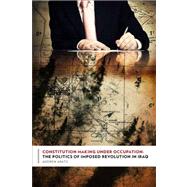Constitution Making under Occupation : The Politics of Imposed Revolution in Iraq
, by Arato, Andrew- ISBN: 9780231143028 | 0231143028
- Cover: Hardcover
- Copyright: 3/1/2009
The attempt in 2004 to draft an interim constitution in Iraq and theeffort to enact a permanent one in 2005 were unintended outcomes of the Americanoccupation, which first sought to impose a constitution by its agents. Thistwo-stage constitution-making paradigm, implemented in a wholly unplanned move bythe Iraqis and their American sponsors, formed a kind of compromise between thepopulist-democratic project of Shi'ite clerics and America's external interference.As long as it was used in a coherent and legitimate way, themethod held promise. Unfortunately, the logic of external imposition and politicalexclusion compromised the negotiations. Andrew Arato is the first person to recordthis historic process and analyze its special problems. He compares the drafting ofthe Iraqi constitution to similar, externally imposed constitutional revolutions bythe United States, especially in Japan and Germany, and identifies the politicalmissteps that contributed to problems of learning and legitimacy.Instead of claiming that the right model of constitution makingwould have maintained stability in Iraq, Arato focuses on the fragile opportunityfor democratization that was strengthened only slightly by the methods used to drafta constitution. Arato contends that this event would have benefited greatly from anoverall framework of internationalization, and he argues that a better set ofguidelines (rather than the obsolete Hague and Geneva regulations) should befollowed in the future. With access to an extensive body of literature, Aratohighlights the difficulty of exporting democracy to a country that opposes all suchforeign designs and fundamentally disagrees on matters of politicalidentity.







